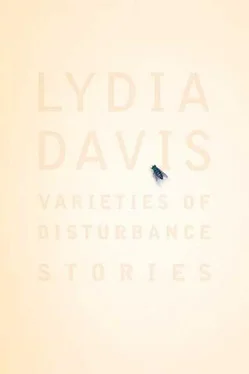Sometimes there are loud thumps from above. At other times he seems to be standing still, and there is something a little mysterious and disturbing in the stillness, since I have trouble imagining what he is doing. Sometimes I hear just a few notes from a saxophone, the same notes repeated the same way a few times or just once before he stops and does not play again, as though something were wrong with the instrument.
There are two buildings on this property, one fronting the street and the other behind it, by the beach, with a small garden in between. My low, ground-floor room does not look out on the beach but on the damp garden. Each house is divided into apartments or rooms, maybe six in all. The landlady sells antique jewelry from a store in the building on the street. Most of the people who live in the buildings have seasonal work here and come to these rooms every summer. They are all quiet and sober, as the landlady made very clear before I moved in. She calls my room an apartment, even though it is just a room, as though there were something vulgar about the word room .
I was wrong about my neighbor upstairs. He is not the friendly man who once greeted me. He is barely polite. He has silver hair and a silver goatee and an unpleasant expression around his bulbous nose.
I was also wrong about the saxophone, which is not played by the man upstairs but by my neighbor across the patch of garden, a woman with a dog.
All week long I had heard people saying there would be a storm. I went out onto the beach, into its first fury, to see it hit the water. After I had stood for a while sheltering my face under my hand and watching the buildings on the piers in the distance vanish behind the curtains and sheets of rain, I went down to the water’s edge, where the wind was much stronger, to see more closely how the rain hit the water. A man in a yellow slicker was dragging a rowboat up onto the sand. The wind came in so hard that it lifted the rowboat and turned it over. It lifted and flung the sand against my legs, stinging them. I took shelter under the motel deck next door, which is up on stilts off the beach. On the deck over my head, plastic chairs were being slung around and tumbled into corners by the wind.
Now the rain is coming down steadily, and the streets, which were empty at the beginning of the storm, are filling with people again, and there is, again, a heavy fish smell in the air. I have hung my clothes to dry from nails in the beams and posts of my room, so that it is a forest of damp garments swaying in the gusts of wind from the door and the windows.
The essay is taking shape now. As the time passes here, time is passing in the travels of the French historian. I trace and describe his itinerary through this country; he progresses, I progress in the essay, and the days pass. I am coming to feel that he is more my companion, in this room, than the live people in this town. This morning, for instance, because in my imagination I had been traveling with him ever since dawn, I felt I was not here in this seaside town but in a damp river valley some hundreds of miles to the west of here. I was in the previous century. This morning, the historian was watching fireworks from a boat in the middle of a broad river. For him it was evening.
It is not an easy piece of writing. I understand the information in the sources I am using, but I have no general background knowledge to draw on. I am afraid it will be very easy for me to make a mistake.
From within the town I look out at the harbor and across the harbor to the sea beyond. The horizon is very far away. But that view itself, because it hardly changes, becomes a sort of confinement. The streets, too, teeming with people, seem always the same. I feel as though I were knocking up against myself at every turn. I am sometimes almost in a panic. That may be because I am also knocking up against the limits of what I can do with this work.
Yesterday I went a little way out of town, far enough to leave the houses behind. I walked past low hills covered with scrub brush and dead oaks, and dunes covered with dune grass, and then a marsh of bright green reeds cut through with channels of clear water.
But I can see that this, though it was so fresh to me today, and such a relief, would become dull, too, if I watched it from my window every day from a house outside town, and then I would need a glimpse of what I can see here: the stone breakwater, the two piers stretching out into the water, the small boats all pointing the same way, the one big, old hulk beached at low tide and leaning to one side; and in the streets the thick crowds constantly stopping at shop windows; the carriages and horses with women drivers wearing men’s formal black suits, their blond hair in topknots; the motley people in a row on the bench before the town hall watching the others walk and drive by; the tall black transvestite who strides up the street in a sequin-covered red dress away from the Crown and Anchor Hotel; the tall white transvestite who stands next to the hotel with his dress open over one lean leg all the way up to his hip, a creased angry look about his long nose under his wig and above his red lips. They are advertising a show at the hotel.
The hotel is a large establishment almost directly across from the plain and tranquil old Unitarian Universalist Meeting House, which is set back from the busy street over an unadorned rectangle of lawn. The church was built in 1874 and is now being restored with the help of a fund raised by a group of painters here. The painters are the most famous inhabitants of this place, along with the writers. Earlier inhabitants were: the Portuguese fishermen and occasional Breton and English fishermen; the whalers; the Pilgrims who first landed here in 1620 and did not stay for three reasons, only two of which I can remember — the harbor was not deep enough and the Indians were not friendly; before them the Nauset and Pamet Indians themselves.
Today in the late afternoon I went to have a beer in the outdoor café next to the small public library, which is an old house shaded by an old oak with a circular wooden bench around its thick trunk. The waiter asked me, “Is there one in your party?” Edith Piaf was singing in the background. I said “Yes” and he brought my beer.
I am thinking about a recent mystery: On the day of the storm something washed ashore that was smooth, rubbery, and the size and shape of a dolphin’s nose, though not the right color. It might have been the back of an upholstered plastic seat from a boat. For a day or two it remained there, moving as the water moved it, sometimes in the water and sometimes on the sand, always in about the same place. Then I didn’t see it for a few days. Today as I was lying on the beach, a man in a ranger’s uniform went under the deck of the motel, dragged the thing out, and methodically tore it to pieces, separating it into different layers. Some layers he left lying on the sand, the rest of it he folded and carried away with him.
The faces of the tourists here reflect what they see all day long, the harbor, the old buildings, the other people in the streets, with openness, even wonder. Only when they look in the shop windows, and seem to consider buying something, do they lose some of their ease and joy. Their faces close into expressions of intentness, care, even exhaustion.
I have been with the old people again. It is restful to me after I have been working, though if the work has not gone well I will not see them at all, preferring to sit with the difficulty than to leave it behind.
When I have made a little progress I am glad to leave it and have their company. In contrast to the work, to the denseness of all the information I am trying to put in some order, their conversation is undemanding. The old woman will talk endlessly if I ask her a question or two; the old man listens to her and sometimes adds a brief comment of his own. They do not seem to notice if I do not talk. Nothing at all is required of me when one says to the other, “Did you take your pills?”
Читать дальше












